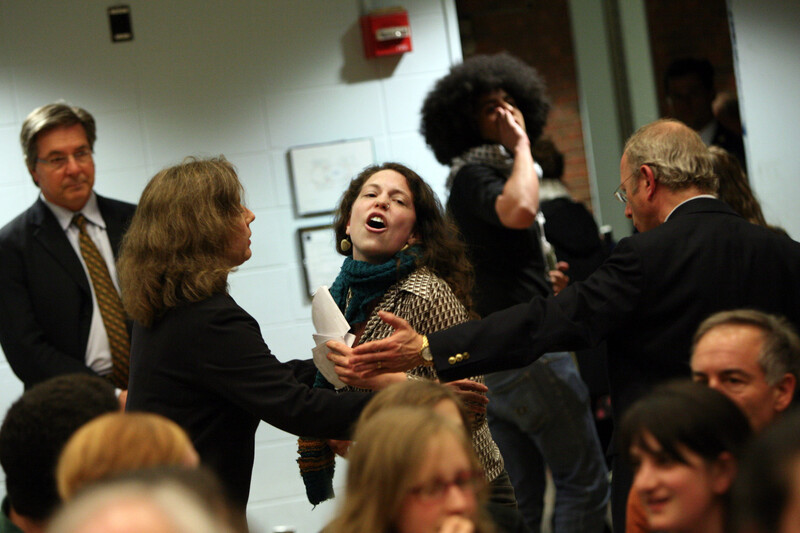The Electronic Intifada 11 December 2013

Outside groups are attempting to undermine campus solidarity with Palestine.
ActiveStillsStudent Rights, a right-wing group posing as a neutral campaign, has pushed several alarmist stories about “Islamic extremists” into mainstream UK media over the last few years.
Another of its main aims is undermining Palestine solidarity activism on British campuses.
Student Rights’ activities were likely key in prompting Universities UK, an umbrella group for higher education, to release new guidance on external speakers last month.
The guidance contains advice that could lead to increased repression of student protests against visiting Israeli diplomats.
This outcome would probably please Student Rights, judging by its history.
Defending the vulnerable?
While Israel’s bloody 2008-09 “Operation Cast Lead” assault on Gaza raged, many students across the UK occupied their universities to protest the silence of their institutions. Many were successful in winning scholarships for Palestinian students, whose access to education is severely restricted by Israel.
This wave of solidarity action confirmed the fears of the pro-Israel lobby that many British universities are “hubs” of pro-Palestinian activism — or “delegitimization” as they term it.
Soon after this, an organization calling itself Student Rights started getting its stories into the British press. According to its website it was founded in mid-2009, in reaction to “increasing political extremism” and “marginalization of vulnerable students on campus.”
However, its director Raheem Kassam admitted to a student newspaper in 2010 that this was actually a veiled reference to the wave of pro-Palestinian activism sparked by Cast Lead (Hilary Aked, “‘Student Rights’ group exposed,” London Student, 1 March 2010).
This complicates the narrative of “extremism on campus” which Student Rights claims is its “raison d’etre.”
“Extremism” at British universities is a hotly disputed phenomenon. The word usually implies some connection to “terrorism,” but is used in a very elastic way and rarely defined in any convincing or consistent fashion.
Yet if Student Rights cites peaceful occupations in support of Palestinian human rights as evidence of “extremism,” could it be that its driving agenda is to oppose the growing Palestine solidarity movement on British campuses?
Front group?
This theory would fit with the fact that Student Rights appears to be backed by a well-funded think tank called the Henry Jackson Society (HJS), a stridently pro-Israel outfit.
Indeed Student Rights may have been created by the HJS.
Similarly, a short-lived pro-Israel media flak group called Just Journalism may have been an HJS side project all along. It was euphemistically referred to as a “partner organization” that “shared an office” with HJS.
There was certainly a high degree of overlap in staff and advisory board members, with names such as Michael Weiss, Douglas Murray, Robin Shepherd, Daniel Johnson and Alan Mendoza cropping up in both the Henry Jackson Society and Just Journalism (Johnson and Mendoza are also on the board of Student Rights).
In 2009 the then director of Just Journalism, Adel Darwish, announced he had resigned from the organization, likening its activities to “a McCarthyist witch hunt.”
Earlier this year the activities of Student Rights were similarly slammed as a “witch hunt” by a National Union of Students officer after it produced a report focusing solely on student Islamic societies.
Financial link
Perhaps the most critical link between Student Rights and the Henry Jackson Society, which emerged more than three years ago, is the financial one.
When Student Rights booked a stall at a London School of Economics Freshers Fair, receipts showed that the money for it was paid by the Henry Jackson Society (“‘Student Rights’ group exposed”).
The office listed in the website domain name record for Student Rights is the same address as HJS (43-49 Parker Street, London). The two organizations have something of a revolving door when it comes to staff members and have produced at least one joint report.
The profile of director Raheem Kassam on Standpoint magazine’s website goes so far as to describe him as “managing Student Rights from within the Henry Jackson Society.” Another HJS staffer has written that Student Rights is “supported” by the think tank.
Perhaps most tellingly, neither group has ever denied the link.
Added to the general Islamophobic climate in Britain and a mainstream media hungry for scaremongering “Muslim extremism” stories, the financial and organizational backing that the HJS appears to be giving Student Rights has helped an outfit with only two staff grab numerous headlines in major British newspapers, including a front page story in The Times.
Pro-Israel agenda
Who is on the Student Rights advisory board?
Until recently, when Liberal Democrat Tom Brake resigned, Student Rights could boast of having members of parliament from all three main political parties on its board. Labor’s Jim Fitzpatrick and Robert Halfon of the Conservatives remain.
But beneath such apparent cross-party involvement, what all three MPs have in common is their support for Israel. All three belong to party political “Friends of Israel” groups. And almost all of the other advisory board members have made enthusiastic public expressions of support for Israel.
But even without analyzing the ideology of its personnel, Student Rights activities have consistently demonstrated its pro-Israel allegiance.
In many respects it seems to be following the advice of influential Israeli think tank the Reut Institute. In a 2010 report, Reut infamously called for the “sabotage” of the Palestine solidarity movement.
Using the parlance of violent Israeli settlers in the occupied West Bank, it has also called for “price tag” attacks against pro-Palestinian activism.
As well as “demonizing” Muslim students as “extremists,” especially when they speak out about the oppression of Palestinians, Student Rights has employed a range of other strategies.
Anti-Semitism smears
One all too familiar tactic has been falsely insinuating that student advocates of Palestinian rights are anti-Semitic. Jade Doswell, a recent law graduate, has first-hand experience of this as a result of her participation in a peaceful protest at Brunel University in west London.
When the politics department invited Israeli diplomat Ran Gidor to speak unopposed in January 2012, a small group from the Friends of Palestine Society held a protest.
The group set up a mock checkpoint using a blue plastic toy gun to imitate Israeli soldiers. Incredibly, a right-wing student then claimed these were realistic imitation firearms and complained to the university. This prompted a formal investigation which saw the students threatened with criminal charges.
A journalism student from Brunel then wrote an article alleging the protest was “violent.” The article also implies that protesters had made abusive and racist comments — the protesters have rejected this allegation and maintain that video evidence proves it false.
While the blogger subsequently amended his article to remove most of these allegations, the account on Student Rights’ website, based on that piece, still carries these defamatory claims.
“Made us feel threatened”
Jade Doswell said: “The whole incident demonized us on campus by repeating a libelous media report in which we were named and falsely labeled anti-Semitic which tarnished our reputations and damaged my student union election campaign. It made us all feel threatened just for standing up for Palestinian rights.”
The episode harks back to an incident in 2009 when Student Rights was still new on the scene.
Director Raheem Kassam made a false claim of anti-Semitic taunting at a public meeting called by the British Committee for the Universities of Palestine in the University of London’s School of Oriental and African Studies (SOAS).
After it became clear that Kassam’s version of events was innaccurate, the BBC soon had to drastically alter a report on the meeting (originally titled “Jewish man jeered at SOAS university debate”). Complaints to the BBC about the piece were eventually upheld, and the report (based on Kassam’s version) deemed “misleading.”
Secrecy backfires
While the tactic of obscuring its pro-Israel line may sometimes allow Student Rights to be more effective than more transparent outfits, it can also backfire.
In January 2010, Student Rights published an opinion piece by a student named only as “Erica” against a student union motion at the London School of Economics to twin with the Islamic University of Gaza.
Strangely enough, the article did not mention that the author was in fact Erica Dobin, president of the Israel Society. The LSE Palestine Society was not invited to submit a response, but one of its members, Sam Bennett, decided to write one anyway.
In an interview with this writer, Bennett explained the reaction he got when the Palestine Society asked for a right of reply.
First, Kassam suggested a long series of amendments. He wanted Bennett to re-focus the piece on “student issues” rather than global politics, arguing it was “too historical,” and suggested Bennett should comment on the Islamic University being, in his words, “Hamas-affiliated.”
Kassam even defended Dobin’s use of the term “disputed territories” to refer to the West Bank and Gaza Strip rather than the legally correct term, occupied territories.
When Bennett sent a polite but firm response declining to make any changes to the article, it was eventually published. But days later Kassam contacted him claiming there had been a “legal threat” and consequently removed the article from the website.
Only when Bennett subsequently agreed to alter the article was it restored to the site.
Kassam’s apparent reluctance to give a platform to pro-Palestinian students is not surprising given his own very obvious and very public support for Israel.
Perhaps this incident explains why Student Rights’ original manifesto — which pledged that the group would “be inclusive of all viewpoints” — was removed from the organization’s website at some point after this episode.
Counter-campaign
Israel is now panicking about the vibrant movement at British universities in support of the Palestinian call for boycott, divestment and sanctions against Israel.
Bearing some resemblance to Daniel Pipes’ Campus Watch project in the United States, Student Rights seems to be a vehicle for the Henry Jackson Society to monitor and attempt to undermine this movement.
Its cleverly-chosen but misleading name not only allows Student Rights to masquerade as an independent organization, but also implies a legitimacy it does not have. This means the British media have erroneously described it as a “student group.”
In stark contrast to its namesake, a new counter-campaign, Real Student Rights, is a genuinely independent, grassroots student campaign that seeks to expose and oppose the activities of “Student Rights.” This network of students, of which I am a part, hopes that “a petition drawing attention to the group’s connections, as well as student union motions condemning their activities (like the one passed last week at the London School of Economics) will discredit the group, limiting their impact on universities and in the media.
Hilary Aked is a freelance writer and researcher, qualified journalist and doctoral candidate at the University of Bath. She has worked in the occupied Palestinian territories and is researching the pro-Israel lobby in the UK.




